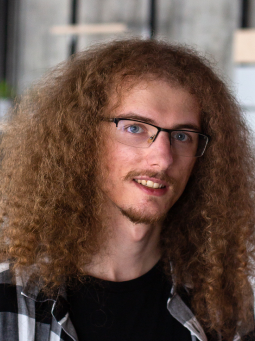This PhD program allows me to delve deeply into my topic of interest and actively work on interesting problems. I feel like I learn something new and develop my technical and soft skills everyday.
Branislav Pecher
We nurture IT talents. KInIT PhD students will become experts in artificial intelligence, starting their education journey with us. Every KInIT PhD student works on their research idea in collaboration with their supervising team.
KInIT PhD students research problem-oriented topics, utilizing advanced research methods with their supervising team. We provide a supervising team depending on the dissertation topic chosen by our PhD students. Apart from your KInIT supervisor, your supervising team usually also comprises external mentors – top scientists from abroad or consultants from industrial research partners (companies). The supervising teams are in some cases connected to international projects.
Our PhD program is a combined form of study, it runs in collaboration with the Faculty of Information Technology at Brno University of Technology (FIT BUT, Czechia). PhD students at KInIT attend and have to pass selected courses at FIT BUT.
A PhD degree is the highest degree of education at KIniT. How it works?
Why PhD at KInIT:
 Róbert Belanec Machine learning with limited (labelled) data Viac info
Róbert Belanec Machine learning with limited (labelled) data Viac info  Róbert Belanec Machine learning with limited (labelled) data
Róbert Belanec Machine learning with limited (labelled) dataSupervising team: Mária Bieliková (KInIT), Ivan Srba (KInIT)
In recent years, the popular transformer models started to require not only a vast amount of computational resources for training but also huge amounts of training data. This leads the large generative models to be very power and cost inefficient. To address these problems, parameter-efficient fine-tuning methods have emerged. In my work, I analyze and utilize these methods and their usefulness in the limited data environment.
 Ivana Beňová Understanding and grounding of multimodal image-language models Viac info
Ivana Beňová Understanding and grounding of multimodal image-language models Viac info  Ivana Beňová Understanding and grounding of multimodal image-language models
Ivana Beňová Understanding and grounding of multimodal image-language modelsSupervising team: Marián Šimko (KInIT), Jana Košecká (George Mason University)
The connection of image and language to multimodal image-language modeling brings many challenges to AI and previous work shows that the current models have misunderstood or unexplored issues, like relying on language priors. These problems suggest that it is essential to understand how models work and how the knowledge is encoded in them. In this dissertation thesis, we are focusing on grounding language in vision and understanding multimodal image-language models. This thesis is supervised by Jana Košecká, professor of computer science at George Mason University, USA.
 Ján Čegiň Machine learning with human in the loop Viac info
Ján Čegiň Machine learning with human in the loop Viac info  Ján Čegiň Machine learning with human in the loop
Ján Čegiň Machine learning with human in the loopSupervising team: Jakub Šimko (KInIT), Peter Brusilovsky (University of Pittsburgh)
Adversarial training is one of the methods to increase robustness of machine learning models used in false information detection. Increasing the diversity of adversarial examples is crucial in successful adversarial training, which is where human-in-the-loop methods come into play.
 Matej Čief Recommender and adaptive web-based systems Viac info
Matej Čief Recommender and adaptive web-based systems Viac info  Matej Čief Recommender and adaptive web-based systems
Matej Čief Recommender and adaptive web-based systemsSupervising team: Michal Kompan (KInIT), Branislav Kveton (Amazon’s lab in Berkeley)
This work deals with some fundamental problems when using off-policy evaluation and learning in multi-armed bandit systems, namely:
(1) off-policy evaluation with large action spaces,
(2) overconfidence in off-policy optimization for structured recommendations, and
(3) designing safe and optimal data-gathering policies.
Supervised by Branislav Kveton, principal scientist at Amazon, focusing on online and offline bandit algorithms.
 Patrik Goldschmidt Network Intrusion Detection Using Machine Learning Viac info
Patrik Goldschmidt Network Intrusion Detection Using Machine Learning Viac info  Patrik Goldschmidt Network Intrusion Detection Using Machine Learning
Patrik Goldschmidt Network Intrusion Detection Using Machine LearningSupervising team: Daniela Chudá (KInIT)
The research focuses on the detection of computer network anomalies and intrusions utilizing machine learning techniques. Instead of following the classical “better model, better results” style, we rather decided to adopt a data-centric approach to the problem. This way, we expect to improve the practical usability of intrusion detection systems by improving data quality rather than creating and fine-tuning complex machine learning architectures.
 Santiago Jose de Leon Martinez Eye Tracking and Recommender Systems Viac info
Santiago Jose de Leon Martinez Eye Tracking and Recommender Systems Viac info  Santiago Jose de Leon Martinez Eye Tracking and Recommender Systems
Santiago Jose de Leon Martinez Eye Tracking and Recommender SystemsSupervising team: Mária Bieliková (KInIT), Róbert Móro (KInIT)
As part of Eyes4ICU MSCA doctoral network, we study eye tracking in recommender systems to better understand users. Using computational gaze models combined with other feedback, we can better understand what information users are receiving throughout their interaction with systems and create better recommendation systems and solve problems, such as biases and filter bubbles.
 Martin Mocko Malware clustering Using Machine Learning Viac info
Martin Mocko Malware clustering Using Machine Learning Viac info  Martin Mocko Malware clustering Using Machine Learning
Martin Mocko Malware clustering Using Machine LearningSupervising team: Daniela Chudá (KInIT), Eset (industry partner)
Our research deals with clustering of samples in the malware domain utilizing primarily machine learning techniques. Our focus is on
1.) clustering evaluation and experiment methodology,
2.) the use of a larger number of clusters, and
3.) the use of deep clustering and contrastive learning in the domain.
The work is realized in cooperation with our industry partner, ESET.
 Peter Pavlík Physics-informed Deep Learning in Forecasting Viac info
Peter Pavlík Physics-informed Deep Learning in Forecasting Viac info  Peter Pavlík Physics-informed Deep Learning in Forecasting
Peter Pavlík Physics-informed Deep Learning in ForecastingSupervising team: Viera Rozinajová (KInIT), Anna Bou Ezzeddine (KInIT), Softec (industry partner)
In cooperation with an industry partner SOFTEC, we focus on using deep learning for efficient and accurate forecasting. To achieve this, we apply principles of physics-informed machine learning. The performance of developed algorithms is evaluated on the task of precipitation nowcasting.
 Branislav Pecher Addressing small labeled data in machine learning training Viac info
Branislav Pecher Addressing small labeled data in machine learning training Viac info  Branislav Pecher Addressing small labeled data in machine learning training
Branislav Pecher Addressing small labeled data in machine learning trainingSupervising team: Mária Bieliková (KInIT), Ivan Srba (KInIT)
To circumvent the issue, many approaches are emerging and are presently researched by many researchers: meta-learning, transfer-learning, weak-supervision, zero/one-shot learning, semi-supervised learning. Each of these fields (or combination thereof) presents opportunities for new discoveries. Orthogonal to this, explainability and interpretability of models is an important factor to consider and advances in this regard are welcome (generally in AI and particularly in the mentioned approaches).
 Ivan Vykopal Natural Language Processing Viac info
Ivan Vykopal Natural Language Processing Viac info  Ivan Vykopal Natural Language Processing
Ivan Vykopal Natural Language ProcessingSupervising team: Marián Šimko (KInIT)
Multilingual low-resource language processing poses unique challenges and opportunities in the field of natural language processing, particularly within the context of misinformation. In our work, we are focusing on the intersection of multilingual language processing and fact-checking, addressing language diversity challenges to enhance factual accuracy.
Transform your curiosity into excellence. If you are interested in doing a PhD degree at KInIT, let us know and contact our admissions team. We can discuss your academic background and research ideas to ensure we have supervisory expertise to support you.
 Mária Bieliková Lead researcher, KInIT Viac info
Mária Bieliková Lead researcher, KInIT Viac info  Mária Bieliková Lead researcher, KInIT
Mária Bieliková Lead researcher, KInITMária Bieliková is an expert researcher at KInIT. She focuses on human-computer interaction analysis, user modeling and personalization. Recently, she has been working in data analysis and modeling of antisocial behavior on the Web. She is active in discussions on trustworthy AI at the national and European levels. Maria has supervised 19 successful doctoral graduates to date. She co-authored 70+ journal publications, 200+ conference papers, received 4,400+ citations (Google Scholar h-index 30), and serves on the editorial board of two CC journals. She has been the principal investigator in 40+ research projects.
 Anna Bou Ezzeddine Senior researcher, KInIT Viac info
Anna Bou Ezzeddine Senior researcher, KInIT Viac info  Anna Bou Ezzeddine Senior researcher, KInIT
Anna Bou Ezzeddine Senior researcher, KInITAnna Bou Ezzeddine is an expert researcher at KInIT focusing on artificial intelligence, machine learning and probabilistic modeling. She has rich experience in nature-inspired computing. In particular, she used nature-inspired computing to help develop a forecasting system that could predict a country’s macroeconomic development. Before her employment at KInIT, she worked in the Faculty of Informatics and Information Technologies at the Slovak University of Technology in Bratislava as an associate professor, where she supervised more than 80 successful Bachelor’s and Master’s theses.
 Peter Brusilovsky Professor, University of Pittsburgh, USA Viac info
Peter Brusilovsky Professor, University of Pittsburgh, USA Viac info  Peter Brusilovsky Professor, University of Pittsburgh, USA
Peter Brusilovsky Professor, University of Pittsburgh, USAPeter Brusilovsky is a Professor at the School of Computing and Information, University of Pittsburgh, where he directs the Personalized Adaptive Web Systems (PAWS) lab. His research is focused on user-centered intelligent systems in the areas of adaptive learning, recommender systems, and personalized health. He is a recipient of Alexander von Humboldt Fellowship, NSF CAREER Award, and Fulbright-Nokia Distinguished Chair. Peter served as the Editor-in-Chief of IEEE Trans. on Learning Technologies, and a program chair for several conferences including RecSys.
 Michal Gregor Lead researcher, KInIT Viac info
Michal Gregor Lead researcher, KInIT Viac info  Michal Gregor Lead researcher, KInIT
Michal Gregor Lead researcher, KInITMichal Gregor is an expert researcher at KInIT. He focuses especially on artificial neural networks and deep learning, on reinforcement learning, and more recently on multi-modal learning and learning that involves language supervision. Michal also has experience in other areas of AI such as metaheuristic optimization methods, representation of uncertain knowledge, probabilistic models and more.
 Gabriela Grmanová Senior researcher, KInIT Viac info
Gabriela Grmanová Senior researcher, KInIT Viac info  Gabriela Grmanová Senior researcher, KInIT
Gabriela Grmanová Senior researcher, KInITGabriela is a senior researcher focusing on artificial intelligence, machine learning, data mining and probabilistic modeling. She has applied her research to energy production and consumption forecasting, microgrid optimization and flow cytometry data analysis.
 Martin Hurban Data Science Team Lead, ČSOB Viac info
Martin Hurban Data Science Team Lead, ČSOB Viac info  Martin Hurban Data Science Team Lead, ČSOB
Martin Hurban Data Science Team Lead, ČSOBMartin Hurban is Data Science Team Lead at ČSOB. He is coordinating AI project implementation within the bank and is leading a team responsible for ČSOB’s digital companion Kate, capability to understand natural language. During his Ph. D. in the area of Solidification of multicomponent alloys, teaching was done in unconstrained optimization, nonlinear programing and numerical methods.
 Daniela Chudá Senior researcher, KInIT Viac info
Daniela Chudá Senior researcher, KInIT Viac info  Daniela Chudá Senior researcher, KInIT
Daniela Chudá Senior researcher, KInITDaniela Chudá is an expert researcher at KInIT. She focuses on information security, in particular behavioral biometrics in the context of user authentication, detection of security vulnerabilities and network anomaly detection. She graduated from the Faculty of Mathematics and Physics, Comenius University. She worked as a researcher and as an associate professor and she is a former vice-dean for Bachelor’s, Master’s and PhD study and student mobility at the Slovak University of Technology.
 Juraj Jánošík Leader of AI/ML section, Eset Viac info
Juraj Jánošík Leader of AI/ML section, Eset Viac info  Juraj Jánošík Leader of AI/ML section, Eset
Juraj Jánošík Leader of AI/ML section, EsetJuraj Jánošík is a Senior Manager of Threat Detection and Machine Learning at ESET. He is the leader of Machine Learning research and is responsible for incorporating ML approaches into ESET’s multi-layer endpoint protection products. He was a member of the international working groups responsible for various botnet takedowns and speaker on conferences like RSA, MWC and CARO.
 Michal Kompan Lead researcher, KInIT Viac info
Michal Kompan Lead researcher, KInIT Viac info  Michal Kompan Lead researcher, KInIT
Michal Kompan Lead researcher, KInITMichal Kompan is an expert researcher at KInIT. He focuses on recommender systems, machine learning, user modeling, and information retrieval. His research is focused on predictive modeling and customer behavior (e.g., churn prediction, next-item recommendation), as well as content-based adaptive models. Michal serves as a reviewer or/and program committee member at several international conferences, such as RecSys, SIGIR, WWW, ADBIS, Hypertext, UMAP and SMAP.
 Jana Kosecka Professor, George Mason University, USA Viac info
Jana Kosecka Professor, George Mason University, USA Viac info  Jana Kosecka Professor, George Mason University, USA
Jana Kosecka Professor, George Mason University, USAJana Kosecka is a Professor at the George Mason University. She is interested in computational models of vision systems, acquisition of static and dynamic models of environments by means of visual sensing, high-level semantic scene understanding and human-computer interaction. She held visiting positions at UC Berkeley, Stanford University, Google and Nokia Research, and served as Program chair, Area chair or senior member of editorial board for leading conferences in the field CVPR, ICCV, ICRA.
Jana is currently mentor of our PhD student: Ivana Beňová
 Branislav Kveton Principal Scientist, Adobe Research, USA Viac info
Branislav Kveton Principal Scientist, Adobe Research, USA Viac info  Branislav Kveton Principal Scientist, Adobe Research, USA
Branislav Kveton Principal Scientist, Adobe Research, USABranislav Kveton is a Principal Scientist at Adobe research. He proposes, analyzes, and applies algorithms that learn incrementally, run in real time, and converge to near-optimal solutions as they learn. He made several fundamental contributions to the field of multi-armed bandits. His earlier work focused on structured bandit problems with graphs, submodularity, and low-rank matrices, and ranked lists. His recent work focuses on making bandit algorithms practical
 Dominik Macko Senior researcher, KInIT Viac info
Dominik Macko Senior researcher, KInIT Viac info  Dominik Macko Senior researcher, KInIT
Dominik Macko Senior researcher, KInITDominik focuses on energy efficiency and security in the Internet of Things environment, from a communication point of view as well as from a device point of view. He focuses on reduction of unnecessary control overhead to create a secure channel and transmit data by strictly power-managed sensor nodes. Also, he deals with anomaly and intrusion detection in IP networks based on communication statistics. Recently, he focuses on robust detection of multilingual machine-generated text.
 Filip Mazán Senior Software Engineer Team Lead, Eset Viac info
Filip Mazán Senior Software Engineer Team Lead, Eset Viac info  Filip Mazán Senior Software Engineer Team Lead, Eset
Filip Mazán Senior Software Engineer Team Lead, EsetFilip Mazán is a Senior Software Engineer and Team Lead at ESET. He is working on various machine learning research projects leveraging deep-learning and he is leading a team responsible for automated threat detection and application of artificial intelligence in threat hunting. Some of the highlights of his career include speaking at the RSA Conference and membership in several botnet eradication groups taking on botnets such as Dorkbot and Gamarue.
 Róbert Móro Senior researcher, KInIT Viac info
Róbert Móro Senior researcher, KInIT Viac info  Róbert Móro Senior researcher, KInIT
Róbert Móro Senior researcher, KInITRóbert Móro is a senior researcher at KInIT. He focuses on user modeling, personalization and machine learning. His current primary research interest is in countering online disinformation and modeling users and human-computer interaction on the Web. He has participated in several international research projects (including Horizon Europe) and served as a program committee member at several conferences (e.g., ACM UMAP, ACM ETRA, IJCAI).
 Peter Richtárik Professor, King Abdullah University of Science and Technology, Saudi Arabia Viac info
Peter Richtárik Professor, King Abdullah University of Science and Technology, Saudi Arabia Viac info  Peter Richtárik Professor, King Abdullah University of Science and Technology, Saudi Arabia
Peter Richtárik Professor, King Abdullah University of Science and Technology, Saudi ArabiaPeter Richtárik is a Professor of Computer Science & Mathematics at KAUST. He is one of the founders and a Fellow of the Alan Turing Institute. Through his work on randomized and distributed optimization algorithms, he has contributed to the foundations of machine learning and federated learning. He serves as an Area Chair of leading machine learning conferences, including NeurIPS, ICML and ICLR.
 Viera Rozinajová Lead researcher, KInIT Viac info
Viera Rozinajová Lead researcher, KInIT Viac info  Viera Rozinajová Lead researcher, KInIT
Viera Rozinajová Lead researcher, KInITViera Rozinajová is an expert researcher at KInIT. She is focusing on intelligent data analysis, particularly predictive modeling, cluster analysis, anomaly detection and optimization. Before her employment at KInIT, she worked as an associate professor at the Faculty of Informatics and Information Technologies at the Slovak University of Technology in Bratislava, where she headed up the Big Data Analysis group. She has authored/co-authored more than 70 publications in scientific journals and conferences and has participated in more than 25 national and international research projects and has led several of them.
 Ivan Srba Senior researcher, KInIT Viac info
Ivan Srba Senior researcher, KInIT Viac info  Ivan Srba Senior researcher, KInIT
Ivan Srba Senior researcher, KInITIvan Srba is a senior researcher at KInIT. Ivan has expertise in artificial intelligence and machine learning, with a focus on data emerging from user behavior on social computing and collective intelligence systems, such as social networks, knowledge sharing systems and e-learning. His current primary research interest is in countering online disinformation and misinformation.
 Ondrej Svačina Business Development Manager and Senior Consultant, Softec Viac info
Ondrej Svačina Business Development Manager and Senior Consultant, Softec Viac info  Ondrej Svačina Business Development Manager and Senior Consultant, Softec
Ondrej Svačina Business Development Manager and Senior Consultant, SoftecOndrej Svačina is a Business Development Manager and Senior Consultant at SOFTEC. He is responsible for managing development of new products and services which often incorporate state of the art technologies, like machine learning and Internet of things.
 Jakub Ševcech Research consultant, KInIT Viac info
Jakub Ševcech Research consultant, KInIT Viac info  Jakub Ševcech Research consultant, KInIT
Jakub Ševcech Research consultant, KInITJakub Ševcech is a Research Consultant at KInIT. He focuses on information security, software engineering, machine learning, stream data processing, anomaly detection and explainable machine learning models. He holds a PhD in Intelligent Information Systems from the Slovak University of Technology.
 Jakub Šimko Lead researcher, KInIT Viac info
Jakub Šimko Lead researcher, KInIT Viac info  Jakub Šimko Lead researcher, KInIT
Jakub Šimko Lead researcher, KInITJakub Šimko is an expert researcher at KInIT, where he also leads the Web and User Data Processing team. Jakub focuses on the intersection of human computation, machine learning and user modeling. He has recently been working on social media algorithm auditing, misinformation modeling and promotes interdisciplinary approaches to computer science research. He graduated from Slovak University of Technology in Bratislava, where, after receiving his PhD, he worked for 7 years as a researcher and teacher. He co-authored more than 30 internationally recognized publications, together receiving more than 350 citations.
 Marián Šimko Lead researcher, KInIT Viac info
Marián Šimko Lead researcher, KInIT Viac info  Marián Šimko Lead researcher, KInIT
Marián Šimko Lead researcher, KInITMarián Šimko is an expert researcher at KInIT. Marián focuses on natural language processing, information extraction, low-resource language processing and trustworthiness of neural models. He is a former vice-dean for Master’s study and alumni co-operation at the Slovak University of Technology.
For more than 30 years, ESET® has been developing industry-leading IT security solutions that protect businesses and consumers worldwide.
Our R&D activities focus on all aspects of cybersecurity – detection of threats, research of malware, APTs, exploits, phishing, spam, monitoring of botnets and targeted attacks, protection of mobile platforms, IoT environment and network infrastructure as well as zero-trust security. We do a lot of data science and machine learning on very complex and extensive datasets.
Research Blog: https://www.welivesecurity.com/
Road transportation and environmental quality are two big research areas at Softec. We have designed our own IoT stations for winter road maintenance and air/noise pollution monitoring. The PhD study should focus on meaningful interpretation and enrichment of the measured data, as well as optimisation and prescriptive analytics with high added value, such as routing of smart road maintenance vehicles, spatial extrapolation of road condition forecasts and air pollution forecasting.
We are ready to provide data from our network of IoT stations measuring meteorological and environmental quality and conditions such as air and road temperatures, air humidity and pressure, air pollutant concentrations, noise level, etc.
ČSOB is one of the largest Slovak banks and, thanks to the other members of the ČSOB Financial Group, provides a wide portfolio of products and services to retail clients, SMEs, the corporate segment, and private clients.
Our research goals are:
Our PhD students participate in these research projects.

Branislav Pecher
Industry PhD is a special format of doctoral program with an industry application. These research projects were co-designed with our industry partners.
Our PhD students have co-authored these publications.
Transform your curiosity into excellence. If you are interested in doing a PhD degree at KInIT, let us know and contact our admissions team. We can discuss your academic background and research ideas to ensure we have supervisory expertise to support you.